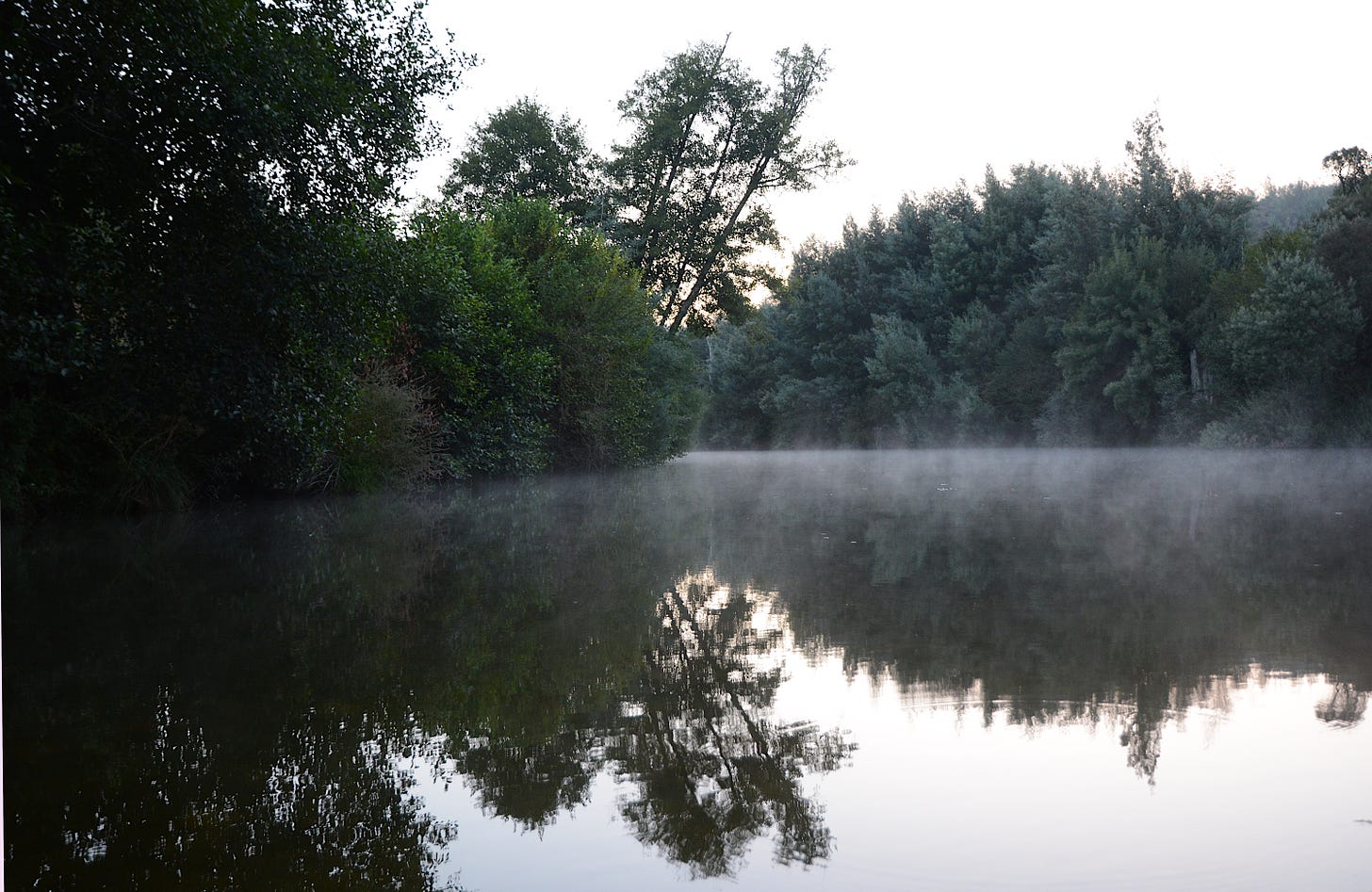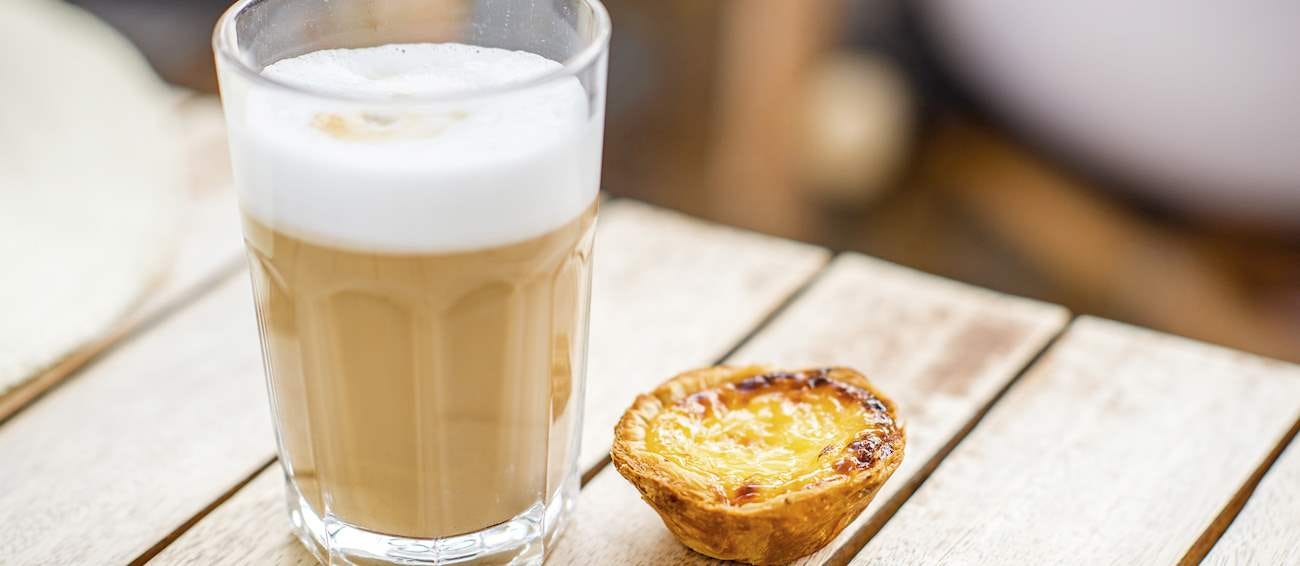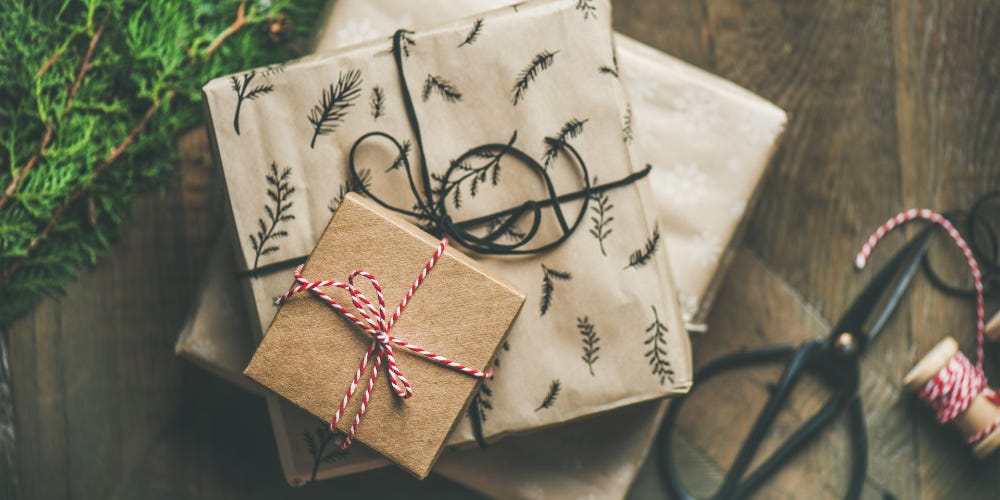The heat of August lingers like a weighty blanket from which you can’t escape. The Fiertzeside gathers at Urtigal, a little known swimming spot on the river Alva in central Portugal. It’s 6:30 in the morning and some of you may choose to take a dip. I recommend the adventure of a longer swim.
Dragonflies, damselflies, pipits, herons and kingfishers are strangers to the humans who venture beyond the confines of the weir. In the distance, in the early morning mist, swimmers look like human buoys. Their journey is to a realm of union rather than separation.
After the swim, we break our fast. A humble offering of galão and a pastel de nata awaits your delight. I meander from our discussion of food security and food sovereignty, to take a detour into a slightly different topic.
In the Trobriand Islands of Papua New Guinea, a man carrying a red shell necklace embarks upon a journey in a hand-paddled boat. At the same time, in the opposite direction, another, carrying a white shell bracelet, will do the same. After travelling in a circle for several hundred miles, a ritualistic exchange of jewellery takes place, a tradition known as the Kula.
The objects are assigned no material value begging the question of ‘why bother?’
It was believed the exchange of gifts provides social prestige to those who participate. Protocol limits who can. Trobriand islander, John Kasaipwalova, offers a different explanation for the Kula’s significance. He stated that the act of “letting go” of a gift matters far more than its material value.
A Kula experience is like having a new child.1
The exchange is an exercise in monikikini, a set of principles which include precision, quiet persuasion, clarity of speech, awareness and perception. It is a practice that has to be mastered, and it is the mastery, not the acquisition of goods that raises the practitioner’s social status.2
Potlatch, a ceremonial form of competitive gift exchange, was, and (after a ban) is still practiced by various societies in the Pacific Northwest of Canada. The ceremony is accompanied by music, dance, storytelling, play, theatre, feasting, and games. In anthropological research, it has been portrayed as a quest by the participants for power and social status. Anthropologists recount the loss of prestige faced by those who fail to match and outperform the previous gift. Unfortunately these interpretations are riddled with western cultural and time-period bias and often say more about values of the researcher than the researched.
The practice has complex and multi-layered significance. The following extract, from Healing Through Culture by Hilistis Pauline Waterfall provides an indication of the value system of the Heiltsuk, a community which practices potlatch.
My Heiltsuk childhood was warm, predictable, and safe. My parents nurtured and instilled Heiltsuk values, including the importance of honesty, respect, generosity, and sharing. The sense of family was strongly rooted. The spirit of community and belonging was solid. Immersion in Heiltsuk ways and language was my reality, as was a healthy diet of natural and abundant Heiltsuk traditional foods. Opportunities to learn and develop essential skills in age-appropriate tasks were provided. A sense of responsibility was instilled as was a sense of confidence and connectedness. Berry picking with my mother was important bonding time, giving me the satisfaction of contributing to my family’s needs. Emerging conflict-resolution skills, social development, team work, and relationship building came from childhood and sibling relationships. (Emphasis my own.)3
These values are sadly lacking in western interpretations of Pacific Northwest coast cultures.
“Our cultural institutions are perhaps the most documented and theorised in modern academic times, yet in my learned view often sorrily misunderstood.”4
From the perspective of “a primary source and a trained specialist who has the lineage and authority to speak”, a misrepresented contemporary Kwakiutl potlatch was described by a highly trained record keeper as being, in part, a living will which involved the naming of successors to chieftainship. The ritual included symbolically passing the weight of responsibility to the heirs’ shoulders through pushing upon them a box of treasures. In part, the ceremony conferred specific social roles within the nobility (such as the role of record-keeper); was in part the culmination of a peace treaty between two nations; and in part to pay those who validated the proceedings.5
When I first met my partner, he gifted a kyanite pendant. The reason had to do with our first conversation and was a direct response to it. The value of the pendant was not in any material worth, but in the expression of a developing relationship. The value to me was that I had not only felt heard, but had been understood. Gift exchange expresses the social relationship between the giver and receiver, or expresses the relationship to be. This is absent in a monetary system which only serves to accentuate our disconnection.
In a monetary exchange, the giver (for example, the producer of a commodity), is often far removed from the person who is receiving (the buyer). In contemporary life, with automated checkout and online consumerism, commodity exchange removes social interaction almost entirely.
This week, I challenged you to guess the topic of this week’s post by filling the gap in the following statements (the same concept applies to each):
In a … the receiver is the provider.
In a … the more you give the richer you are.
In a … giving without explicit conditions is used to foster a system of social ties and obligations.
Instead of accumulating material wealth, participants in a … use it to accumulate social wealth.
How did you get on? If you came up with gift economy, (or potlatch) bravo! Here … have an extra pastel de nata.
Gift Economy
As much as we’re all familiar with the basic concept of gift economy, it only emerged in my explicit consciousness after reading Sacred Economics by
.A gift economy is a system whereby goods and services are given without the expectation of renumeration or reciprocation. You will, no doubt, have been a recipient and a giver, but not necessarily both in the one exchange.
Having professionalised freely given interactions, through converting services into paid commodities, we have made ourselves dispensable, easily exchanged for somebody else. In a monetary system we can say, “I don’t need you anymore”, and if I don’t need you, or you, or you, then I don’t need community. And that is essentially what has happened. The ‘I’, shaped through its curation of commodities, has effectively isolated itself from community. To compensate, it instead seeks validation from strangers’ likes and shares. With only a few (if at all) will it form close unconditional connection.6
The more acquisitive people have become, the more it seems they lose - time for relationships, children, healthy meals, connection with nature, compassion for strangers, the names of neighbours, mental health …
Wherever I go and ask people what is missing from their lives, the most common answer (if they are not impoverished or seriously ill) is “community.” (Charles Eisenstein)
I used to travel to and from work using public transport, a round trip of three hours, which I could have done without, but I wouldn’t have swapped it out for travelling alone by car. My world was made larger, meeting commuters from all walks of life and gaining insights into perspectives so different from my own. I often felt gifted with the stories they shared and I believe they felt gifted by the act of listening. Familiar strangers became friends, and on that journey travelled a small community of people who would step in to help another in need.
Communities have eroded and if you ask why, and then why again, a few levels down, the answer lies in the monetary system.7
In a gift economy, the exchange instead strengthens interrelationships, reduces alienation and increases community ties. In crises we need community, and never more than now.
Why deers don’t have to pay to eat leaves
Humans are the only species on the planet to operate without a gift-based economy. A deer doesn’t have to pay for the leaves it takes from the tree. That doesn’t mean the leaves are any less valuable. However, the exchange has social benefits. The receiver becomes the provider. It poops. The poop may be useful to the tree, but this form of direct exchange isn’t necessary. Nor does the tree find it necessary to keep track of the ‘takes’. It is useful, however to the wider community of which the deer is a part.
If a gift economy is the natural state of being, then to re-adopt a gift economy in society is to be human - a human being.
Rainbow Juncktion, is a not-for-profit café/restaurant, based in the city of Leeds, UK, which intercepts the food waste from other restaurants and supermarkets to provide healthy meals. If that wasn’t something to celebrate in itself, it also operates using a gift economy. Volunteers provide labour and you pay what you feel/can for the meal and service.
If that sounds like a bad business model, the Rainbow Junktion founded in 2014, survived the pandemic and thrives. It is highly rated on TripAdvisor, and manages to provide real, kind support for families that cannot feed themselves, and those who need financial, housing and mental health advice.8
Another good reason for reviving the gift economy is that it could be good for your health. This week,
who writes the , told the incredible story of Andie Mackie who made a career of generosity after nine heart surgeries and being medically advised to take fifteen different medications. His gifting started by spending a month’s worth of medical budget on harmonicas instead of drugs, which he then gifted to children. Still alive after a month, he bought and shared more. His gifting grew and continued to grow.Andie lived for thirteen years after giving up his medication, giving the gift of music to more than 12,000 kids, along with more than 20,000 harmonicas, 5,000 strum sticks, and 500 scholarships. Andie said it was his secret to happiness.9
A moneyless life is possible
Daniel Suelo realised he could live without money after a period of time living off the land in Alaska. And, he says, it was great. He hitch-hiked home to Utah with just $50 in his pocket. He landed with $25, the rest having been spent on stuff he didn’t need.
I Know It Is Possible To Live With Zero Money, Abundantly
How? Because it has happened to me,
as it's happening to ants and deer and slugs and sparrows
and bacteria and atoms and galaxies.
That's right, it's
Nothing Special.
It's happening to the whole, infinite universe
outside our teeny-tiny itty-bitty Babylon we call "civilization"
(which we think is the whole universe).
Yup, I boast!
I boast about
Nothing Special.
Let the Nothing-Specials boast,
for Babylon has boasted its delusions of "value" & "progress",
and trampled Nature,
shat on Beauty,
long enough.
Enough10
Daniel only came out of 15 years of a moneyless life in order to care for ailing parents. His reflection and insight are astoundingly philosophical and thought-provoking. His Tedx talk inspired the title of this post. The deer metaphor is his.
After just a month of our gatherings at The Fiertzeside, I am warmed by your response. Your welcome and support has been so genuinely given, I find myself without words enough to express my deep appreciation.
One message in particular came from a mother who saw the inspirational impact of the newsletter on her eighteen year old daughter. I understood, in that moment, the importance of this endeavour. There is no greater gift to receive than the knowledge that even these few stories have the power to restore hope. If they can do it for one, then they can for all who need a glimmer of light.
“Spread the word. Not enough people realize just how bad it is and how much hope there is, all at the same time. A serious situation, but a lot of good work going on all around the world, various efforts to address various parts of the climate crisis.”
Dr. Leslie Field in interview with
who writes , a newsletter which “offers data-driven independent journalism sharing regular news roundups on climate and biodiversity progress from around the world”. (Emphasis my own)
I had been tossing around the idea of paywalling the archive of this newsletter since it was conceived. This week, as the first post was due to go behind the paywall, the messages received were a resounding call in favour of keeping the stories alive to be read rather than hidden.
The Fiertzeside is now officially a gift-economy.
As Leslie said, these stories of hope need to be shared. Then shared again.
Embers:
has availed of the Chat space to share three positive news stories. Please add any of your own! You can access these by chatting the Chat tab at the top of the webpage. Thank you, Kim!Up Next:
How many hectares and swathes of land do you really need for food security?
Until then, have a super week.
Kasaipwalova, J. cited in Kuehling, S. (2003) Kula: Myth and Magic in the Trobriand Islands, and: Kula: Ring of Power (review). The Contemporary Pacific 15(2):512-516 https://www.researchgate.net/publication/236714746_Kula_Myth_and_Magic_in_the_Trobriand_Islands_and_Kula_Ring_of_Power_review Date accessed 23/08/2023
ibid.
Waterfall, H.P. Healing Through Culture (2018). In Tortell, P., Turin, M. & Young, M. (eds.) Memory (pp. 9-20) https://books.google.co.uk/books?hl=en&lr=&id=mM5wDwAAQBAJ&oi=fnd&pg=PP1&dq=hilistis+Pauline+Waterfall&ots=peGfwCpS-q&sig=Tpmm1cUK0HdFuRE87HZgOOGjUiY#v=onepage&q=hilistis%20Pauline%20Waterfall&f=false Accessed 27/08/2023
Sewid-Smith, D. M. (1997). The Continuing Reshaping of Our Ritual World by Academic Adjuncts. Anthropology & Education Quarterly, 28(4), 594–602. http://www.jstor.org/stable/3196247. Date accessed 27/08/2023
ibid.
After a couple of conversations on Notes, I have undertaken the task of replacing the urge to press the Substack hearts with a comment. At some point in the future, I may post my reflection, but essentially, I now see it as gifting in a way that the like/love button is not.
Eisenstein, C. (2010) A Circle of Gifts. https://charleseisenstein.org/essays/a-circle-of-gifts/. Date accessed 25/08/2003.
All Hallows Leeds (2023) Read the Full Text of Emily’s Powerful Message to a City Council Meeting. https://www.allhallowsleeds.org/news/read-the-full-text-of-emilys-powerful-message-to-a-city-council-meeting Date accessed 25/08/2023
I came across Heather’s retelling of this story via
who writes .Suelo, D. (2023) Living Without Money. https://sites.google.com/site/livingwithoutmoney/Date accessed 25/08/2023













It is half a day later since I opened this post, expecting nothing, gaining something that has thrown me back onto the conundrum of the Substack paywall. Thank you is too small for what your words hav given me. The "upgrade to paid" button I'm about to push is small payment for the freedom I feel stirring within as I begin to strip away the paywall that I have anguished over. I believe generosity is born in gratitude. I am not recommending this for everyone; however, that's the north star I am going to follow.
You've written another beauty, Safar! I love the subtitle. It invites us to think about our gifts as contributions to the health of the whole organism of which we are a part. This really helps to break down the giver/receiver binary that you hinted about in the Chat. (And once the binary is broken, I wonder what it looks like to give gifts to oneself, as well as others? This seems especially important for any givers who are trying to disengage themselves from host/parasite relations. Then it's ok to cut off gifts to the other and redirect that energy as gifts to self, hopefully toward a healthier ecosystem.)
On Substack we seem to participate in two economies at once. First comes the community where people give freely the gift of attention, care, and response. Second comes the economy of exchange that pays (at the very least!) for other Substacks and other necessities. For some people, the order is reversed, but in either case, it is a delicate matter to try to do both. My answer was to ignore the exchange economy for six months by simply keeping payments off. But in my case it's time to wobble into the space between the two economies and see how to make it work.